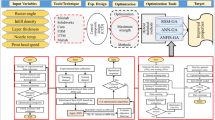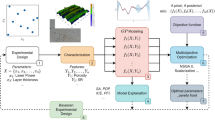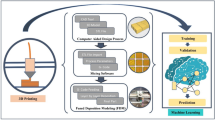Abstract
In this research work, we investigated the optimization of input parameters for additively manufactured specimens fabricated by Fused Deposition Modeling (FDM) to maximize tensile strength. We employed two metaheuristic optimization algorithms, Particle Swarm Optimization (PSO) and Differential Evolution (DE), to determine the optimal input parameters, including infill percentage, layer height, print speed, and extrusion temperature. Additionally, we coupled both PSO and DE algorithms with the XGBoost algorithm, a powerful gradient boosting framework, to assess their performance based on Mean Squared Error (MSE) and Mean Absolute Error (MAE) values. Our study revealed that the MSE and MAE values of the coupled PSO-XGBoost algorithm were lower compared to the DE-XGBoost algorithm, indicating superior performance in finding optimal input parameters. The results suggest that the integration of PSO with XGBoost can provide an effective approach for optimizing FDM-fabricated specimens, leading to improved tensile strength and overall mechanical properties. This research offers valuable insights into the applicability of metaheuristic optimization algorithms in additive manufacturing and highlights the potential benefits of coupling these algorithms with machine learning models for enhanced parameter optimization. The findings contribute to the ongoing development of optimization techniques in additive manufacturing, providing a foundation for future work in this area.
Access this chapter
Tax calculation will be finalised at checkout
Purchases are for personal use only
Similar content being viewed by others
References
Asadi-Eydivand M, Solati-Hashjin M, Fathi A, Padashi M, Osman NAA (2016) Optimal design of a 3D-printed scaffold using intelligent evolutionary algorithms. Appl Soft Comput 39:36–47
Deswal S, Narang R, Chhabra D (2019) Modeling and parametric optimization of FDM 3D printing process using hybrid techniques for enhancing dimensional preciseness. Int J Interact Des Manuf (IJIDeM) 13:1197–1214
Han Y, Jia G (2017) Optimizing product manufacturability in 3D printing. Front Comp Sci 11:347–357
Ferretti P, Leon-Cardenas C, Santi GM, Sali M, Ciotti E, Frizziero L, Donnici G, Liverani A (2021) Relationship between FDM 3D printing parameters study: parameter optimization for lower defects. Polymers 13(13):2190
Radhwan H, Shayfull Z, Nasir SM, Irfan AR (2020) Optimization parameter effects on the quality surface finish of 3D-printing process using taguchi method. In IOP Conference Series: Materials Science and Engineering 864(1), p 012143. IOP Publishing
Najmon JC, Raeisi S, Tovar A (2019) Review of additive manufacturing technologies and applications in the aerospace industry. Additive manufacturing for the aerospace industry, pp 7–31
Vignesh M, Ranjith Kumar G, Sathishkumar M, Manikandan M, Rajyalakshmi G, Ramanujam R, Arivazhagan N (2021) Development of biomedical implants through additive manufacturing: A review. J Mater Eng Perform 30(7):4735–4744
Sing SL, An J, Yeong WY, Wiria FE (2016) Laser and electron-beam powder-bed additive manufacturing of metallic implants: A review on processes, materials and designs. J Orthop Res 34(3):369–385
Ghaffar SH, Corker J, Fan M (2018) Additive manufacturing technology and its implementation in construction as an eco-innovative solution. Autom Constr 93:1–11
Goldberg DE (1989) Genetic algorithms in search, optimization, and machine learning. Addison-Wesley Longman Publishing Co., Inc, Boston, MA, USA
Sehgal A, Ward N, La H, Louis S (2022) Automatic parameter optimization using genetic algorithm in deep reinforcement learning for robotic manipulation tasks. arXiv preprint arXiv:2204.03656.
Prakash SO, Jeyakumar M, Gandhi BS (2022) Parametric optimization on electro chemical machining process using PSO algorithm. Materials Today: Proceedings 62:2332–2338
Gómez N, Peña N, Rincón S, Amaya S, Calderon J, (2022) March. Leader-follower behavior in multi-agent systems for search and rescue based on pso approach. In Southeast Con pp 413–420. IEEE
Storn R, Price K (1997) Differential evolution—a simple and efficient heuristic for global optimization over continuous spaces. J Global Optim 11(4):341–359
Author information
Authors and Affiliations
Corresponding author
Editor information
Editors and Affiliations
Rights and permissions
Copyright information
© 2023 The Author(s), under exclusive license to Springer Nature Switzerland AG
About this chapter
Cite this chapter
Mishra, A., Jatti, V.S., Paliwal, S. (2023). Evolutionary AI-Based Algorithms for the Optimization of the Tensile Strength of Additively Manufactured Specimens. In: Adadi, A., Motahhir, S. (eds) Machine Intelligence for Smart Applications. Studies in Computational Intelligence, vol 1105. Springer, Cham. https://doi.org/10.1007/978-3-031-37454-8_10
Download citation
DOI: https://doi.org/10.1007/978-3-031-37454-8_10
Published:
Publisher Name: Springer, Cham
Print ISBN: 978-3-031-37453-1
Online ISBN: 978-3-031-37454-8
eBook Packages: Intelligent Technologies and RoboticsIntelligent Technologies and Robotics (R0)




